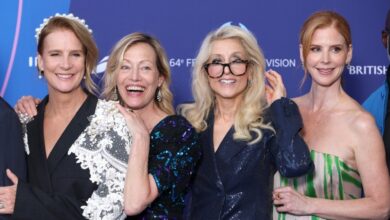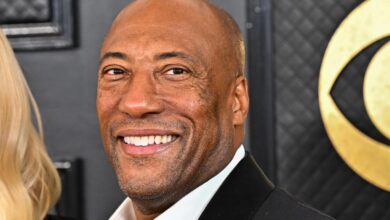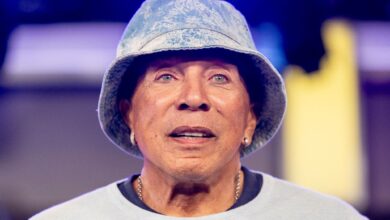Canadian Networks Lean on Familiar Franchises, U.S. Formats at Upfronts

Canadian Broadcasters Embrace American Formats Despite Push for Canadian Content
Despite the current push for Canadian-made products in the wake of Trump’s tariff wars, Canadian broadcasters are doubling down on American formats and partnerships for the upcoming television season.
Bell Media, Corus, Rogers Sports & Media and the Canadian Broadcasting Centre (CBC) each took a day to present their upfronts in Toronto last week to advertisers and press. During the four-day frenzy they flew in talent, presented red carpets and unveiled plans for consolidated ad sales.
The presentation styles varied, as CBC opted for a breakfast event and Rogers did theirs virtually, but the message was the same: when it comes to programming network television, U.S. content still reigns supreme.
Unlike American schedules, which tout homegrown content, Canadian TV schedules are historically anchored with U.S. acquisition programming. These are the series that draw Canadian advertisers and viewers, who are impressionable to marketing campaigns on both sides of the border. The schedules are then punctuated with costlier Canadian content, which networks are regulated to do under current Canadian Radio-television and Telecommunications Commission (CRTC) rules.
The exception is the Canadian Broadcasting Corporation (CBC), whose main schedule and streaming service, CBC Gem, is made up of Canadian fare. This year the CBC surprised many during its presentation with heavy investments in factual programming but no new scripted series, although executives say they have announcements to make in the coming months.
“We’ve greenlit more than a handful of scripted shows, but there are steps that have to be taken, post green light, pre camera rolling and production,” says Barb Williams, executive VP at CBC. “We need financing partners for all of our productions and in some cases, the producers are still working on getting that final piece of financing. In other cases, casting is still unconfirmed. So this particular year, for a number of different reasons, we were not in a position to fully announce.”
Despite the clear call for patriotism in Canadian media and advertising over the past three months, there were no major water cooler Canadian moments from the three private networks, either. CTV, Global and Citytv were once again anchored by U.S. content, and each network head promised advertisers that they had purchased the most exciting new series.
Acquiring those U.S. series at the LA screenings is part money, part pre-existing relationships with the studios, which often leverage buzzy titles to offload less appealing fare through bundles.
“The long-term relationships we have with many of the big studios are really important,” says former CEO of Corus Entertainment, Troy Reeb, who departed the company two days after its upfront. “Where we can, we start those conversations early, oftentimes as soon as the show’s in development and especially when they’re wanting to shoot in Canada, as many shows are now. We look for those opportunities.”
Sometimes those partnerships can backfire though, as Corus and Bell Media learned last year when Rogers Sports & Media announced a new deal with Warner Bros. Discovery that ended decades-long runs of networks like Food Network Canada, HGTV Canada (Corus) and Discovery Canada (Bell).
Those channels transferred to Rogers ownership in January under their original titles. Corus lost all American programming on those top-rated specialty channels and raced to rebrand as Home and Flavour channels by capitalizing on Canadian talent like Bryan Baeumler, Scott McGillivray and Anna Olson. Over at Rogers, execs used the upfronts to confirm original series for Food Network and HGTV, including a new project from Drew and Jonathan Scott, the launch of “Home Town Takeover Canada,” the return of “Come Dine With Me Canada,” and a new David Rocco series.
Bell Media, meanwhile, initially sought damages but settled the legal dispute in October after extending its partnership with Warner on HBO and HBO Max content for multiple years. That partnership ensures HBO Max won’t launch independently in Canada anytime soon, and allows Crave to continue bolstering subscribers with popular shows like “The Last of Us” and “House of the Dragon.”
“HBO is an important part of the Crave offering, and I’d be lying if I didn’t say that was true,” says Justin Stockman Vice-President, Content Development & Programming at Bell Media. “When we look at our top series, several of them are HBO.”
The decline of network viewers and the recent Warner situation may have taught Canadian TV execs a few hard truths, however, and it appears as though more CanCon is on the horizon. There were few cancelled scripted series this year, and while original commissions on network were scarce, execs confirmed several Canadian formats including the return of “MasterChef Canada” and “The Traitors Canada” on CTV and the launch of “The Price Is Right Tonight,” which will film in Toronto with host Howie Mandell, and air next year on Citytv.
“Our Canadian programming has always been about telling Canadian stories and finding programming that really resonates with our audience,” says Kale Stockwell, Head of Original Programming at Rogers Sports & Media. “I think you can take a really well known franchise like ‘Law & Order’ or ‘The Price is Right’ or even ‘Hometown Takeover’ and you can put a uniquely Canadian spin on it that speaks distinctly to the Canadian market.”
This year’s arguable LA Screenings winner was “The Office” spinoff “The Paper,” which wound up at Corus Studios thanks to its overall partnership with Peacock. The series will air on specialty channel Showcase, alongside with Peacock’s Simu Liu series “The Copenhagen Test” and Emilia Clarke’s “Ponies” in a bid to push subscriptions to Showcase’s StackTV streaming channel.
“StackTV is, strategically, our most important product,” Reeb says. “It’s incredibly important that there be Canadian voices in an increasingly crowded streaming ecosystem. StackTV has been a great little growth engine and we want that to continue.”
Over at Bell, Crave is building on its HBO Max and Starz libraries with new French and English CanCon including a new “Bon Cop Bad Cop” format, the return of “Project Runway Canada,” an untitled Jared Keeso project, and a new iteration of “Match Game” hosted by Martin Short. It also announced the pickup of “Tom Green’s Funny Farm,” and Elliot Page’s “Slo Pitch,” along with a new queer hockey comedy, “Heated Rivalry,” from “Letterkenny” co-creator Jacob Tierney.
“We’re looking for it all. We’re looking for IP and we’re looking for content creators,” says Carlyn Klebuc, Bell Media’s General Manager, Original Programming. “We’re looking for everything, because we’re looking for something that’s going to cut through, that’s going to be buzzy, that’s going to engage audiences.”
In the development arena, Crave seems the best poised to develop successful content with international appeal that will give it a competitive edge. Altogether, it announced 116 original new and returning titles for its 2025/26 English and French-language slate. It also announced the expansion of Crave to include networks CTV and Noovo, as well as select sports, news and kids content by the end of the year, and confirmed that new bundling offers with Disney+ and TSN will launch in the upcoming months.
The news comes on the heels of Bell Media’s recently investment in Blink49 studios and its acquisition of a majority stake in global content distributor Sphere Abacus.
“This isn’t some sort of rescue mission for Crave which is having its best year ever,” Stockman says. “Q1 of this year was our most watched quarter ever. Last year was our most watched year. Crave continues to grow. The strike was hard because a lot of the series that we wanted were delayed, but post-strike, we’re on fire.”





